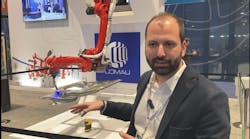[sidebar id="1"]
This is the fourth of our quarterly columns about the developing careers of several young engineers. You'll find the first three columns at: "Young Professionals Map Careers," "A Googolplex of Automation Resources" and "The Source Code of the Future?"
Generation Y is the offspring of the Baby Boomer era. They're often said to be sophisticated, technology savvy and immune to most traditional marketing and sales pitches.
SEE ALSO: Motivation 101: How Do You Define Success?
You met six engineers in this column this year. We're just seven of more than 70 million hopeful Generation Y graduates looking to rescue the world from the recession sinkhole. We are the third wave of graduates embarking on our careers — taking the place of our parents in an increasingly multigenerational workplace.
This year's columns discussed how recent graduates obtain their first real-world jobs, how they use evolving technology and the web to help them do their jobs better and how social media impacts the ways multiple generations communicate.
We continue to hear employees argue there's a lack of pay, while employers bemoan a lack of skilled workers. Through the years, our writers covered both sides of the argument. Some of our most popular pieces include: "How to Build a Skilled Workforce," "Cooperative Provides Skilled Workers," and "Lack of Skill or Lack of Respect?" Each of these articles touch on the need for improved science, technology, engineering and math (STEM) education to get students prepared for jobs after they graduate and the pay gap that lingers over the heads of old and new hires.
Sam Strickling, academic and broad-based research marketing manager for National Instruments, whom we met in previous columns, says the argument is fueled by a poor economy and a lack of engineering education. Strickling works with university partners organizing mechanical design sponsorships for NI. "We noticed a decline in enrollment, but also a decline in retention over the last couple years," he says. "So what I really strived to do when I took this role was try to ask questions such as 'How can I change that? How can I help get engineers ready for industry?'"
Education for these industries starts with teaching students how to "do" engineering, rather than solely teaching them the "theory" of the job, Strickling says. While theory is a necessary part of a student's education, he says, putting theory into practice is the best way to get them prepared for the real world.
Creating projects that are geared more toward open-ended problem solving is a great way to do this. "It's really getting them ready to do what a typical engineer does in these industries, which is to develop their own model framework and their own tools, so when they actually get to the job market it's not shocking," Strickling says. "It also sets them apart from other engineers coming out of school at the same time. I think we're starting to see fewer and fewer of these kinds of specialized engineers, where you're hired to do one job and one job only. I call it conveyor-belt engineering. I think that's something that will become less and less effective. I love the new trend of multi-disciplinary engineering. I think it's a great way to actually see how engineering works at the industry level."
While Strickling sees multi-disciplinary engineering as an asset to a company, Martin Copeland, our PLC programmer for CCK Automations from former columns, says in the controls field, you're more efficient if you have a specialty. Otherwise, you know very little about a lot.
Two or three months ago a contractor CCK Automations hired was discussing the pay versus skills gap. He argued that the controls field is getting broader. The contractor told Copeland that there are so many different areas to go into in the controls world, and everyone is expected to know how to troubleshoot all issues that arise.
"There's so much information that it makes it difficult for people in the industry not to specialize in a single aspect of the job," Copeland says. "You have to have a certain specialty, even though employers are demanding a well-rounded engineer."
Initially, Copeland didn't agree with this argument, but now that he's further along in his career, he understands the frustration of professionals who have been working much longer.
Tom Pasterik, manager of applications engineering for 3D printer builder ExOne, whom we also met earlier, says what you put into your education is what you will get out of your career. Pasterik saw his first job as a place to set himself apart from others. The salary you get is based on your performance, he says.
"When I started, I was happy to get a job no matter what they paid me," Pasterik says, "Maybe I don't deserve the best job, but I do deserve a decent paycheck at the end of the week. I also have to prove to the company that I deserve it. I completely believe in probation periods."
Bill Purcell, mechanical engineer supervisor for integrated display and scoring solutions at Nevco, couldn't agree more with Pasterik. Everyone to an extent thinks they're not being paid enough, he says.
If we want to make more money, we need to perform above and beyond the competition to prove we deserve a raise. If you're talented, work hard and think outside the box, you will go far in any STEM field, Purcell says.
Strickling sets a goal every year to increase the number of schools he works with, and to improve the schools' curriculum, so they can get more students ready for their first jobs. He says getting more students interested in industry-related subjects and developing more projects for them to showcase their work is a great way to do this. "If we could do that in the next couple years, I would consider it a success," Strickling says.
Purcell adds he always thought he'd be working in the automotive industry, but because those jobs are not prevalent where he lives, he found himself at Nevco. "I would say depending on where you live plays into what type of job you have after college," he says. "I never dreamed I'd be doing what I'm doing."
Purcell reports he's happy gaining as much on-the-job experience he can at his position over the next five or more years. After that, he would like to move into management, and later on to an executive position at the company.
Copeland found the exact job he was looking for in college. He says he feels lucky to have landed a job he loves so early in his career. When he first got into it, he thought, "Wow, there's so many cool things that I can do with sensors and controllers." The initial idea, he says, "was to figure out some idea and run with it to start up a little freelance business, and then take off with it. The plan right now is to stay and learn as much as I can, and maybe something will strike me."
Pasterik presently spends less time at his current position working on design than he does working on applications, but the role has opened doors to more business opportunities. He says his future goals involve finding a job within the company that would give him an even balance of design and application experience.

Leaders relevant to this article:



